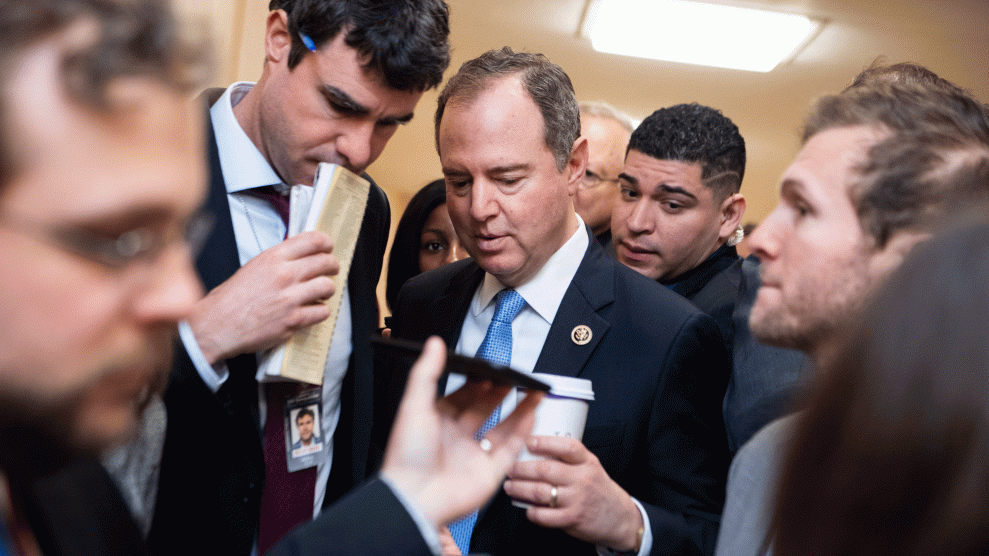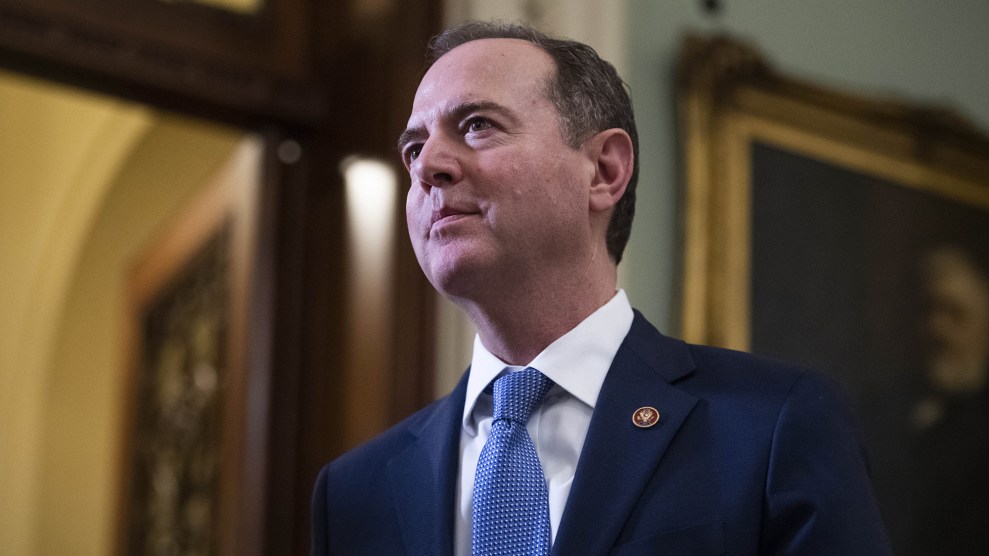
Tom Williams/AP
On April 8, President Trump posted one of his routinely outrageous tweets: “Once we OPEN UP OUR GREAT COUNTRY, and it will be sooner rather than later, the horror of the Invisible Enemy, except for those that sadly lost a family member or friend, must be quickly forgotten.” Quickly forgotten. As in no looking backward, no finger-pointing over why his administration’s response was lackadaisical and inept—and likely led to the deaths of thousands of Americans who might have otherwise survived. Nothing to see. Keep moving.
But not so fast, said Rep. Adam Schiff, chair of the House Intelligence Committee. Two days later, he and several Democratic colleagues in the House introduced a bill to set up a bipartisan commission—based on the 9/11 Commission—to investigate the US government’s preparation (or lack thereof) for the coronavirus attack and the steps and missteps the Trump administration took in reacting to the pandemic. And Senate Democrats are proceeding with a similar bill in their chamber. So a political clash may be coming: Will there be any accountability for Trump’s actions (and inactions) during this crisis?
In an interview with Mother Jones, Schiff explained why such an investigation is needed and why the battle to remember and learn is crucial. Asked whether that Trump tweet signaled that the president and the Republicans will push a let’s-forget-and-move-on message if the pandemic subsides, Schiff replied, “I wouldn’t be surprised. No matter what the result or the extent of the loss of life, you can bet the president is going to talk about his response being the perfect response to this pandemic. But nonetheless, no, this is not going to be forgotten. If we were to forget it, we could pretty well be guaranteed a repeat of this when the next coronavirus comes along.”
Schiff pointed out that the 9/11 Commission—which eventually produced an elegantly written report that in devastating detail chronicled all that had gone wrong within US intelligence, the White House, law enforcement, the military, and aviation on the day of the attack and the weeks, months, and years prior—initially drew opposition. At the time, both President George W. Bush and Vice President Dick Cheney claimed no such investigation was needed, and their administration fought against legislation to establish it. Bush, Schiff noted, “was afraid that it was going to establish fault with his handling of 9/11 or the run-up to 9/11.” But, the Congress member added, “that position was overcome by very powerful groups of victims of 9/11 who came together and coalesced to demand answers of their government. They were the ones who essentially pushed through that legislation and then made sure the commissioners who were appointed were in fact objective fact-finders, made sure that witnesses cooperated with the commission. And then [they] were very important in making sure the recommendations of the commission were in fact followed through. I think you’re going to have exactly the same phenomenon here, where people who lost loved ones to the virus, people that went thru the ill health effects of it, and thousands and tens of thousands of health-care workers on the front lines, who right now are really experiencing a trauma not seen outside of wartime—they’re going to demand accountability and demand answers.”
Schiff was correct in recalling that the relatives of people killed in the 9/11 attacks—particularly a savvy group of widows of financial firm executives who perished in that massacre—mounted a crusade that attracted media attention and shamed reticent Republicans into accepting the commission. Before introducing his bill, Schiff spoke to former 9/11 commissioners and legislators who had pushed for that investigation, and they each highlighted the importance of mobilizing similar constituencies to support the proposed coronavirus commission.
For Schiff, the need for this commission is obvious: “The American people really have a right to know and a need to know why we were caught so flat-footed by this virus. Why we didn’t have the ventilators we should have had, why we didn’t have the stockpiles of protective gear, why it took this country, which leads in sciences, so much longer to develop a test and distribute it than other countries. Why we still to this date don’t really know how many Americans have this virus. And we lost such precious weeks and months in the handling of the response. These questions are going to have to be answered. Why the federal government isn’t playing more of a role in helping [with] the logistical challenges. States now are competing with each other and being outbid by the federal government. You couldn’t describe a much more uncoordinated response by the administration. And now they’re setting up another task force…Jared Kushner’s task force. It’s a model, I think, of incompetence. And when you’re dealing with a pandemic, incompetence kills.”
But will Trump and the Republicans even consider for a nanosecond establishing such a commission? The Republicans succumbed to public pressure after 9/11. But the political landscape two decades later is mighty different, and the GOP’s main mission these days appears to be defending Trump no matter what. Do Republicans want attention focused on the life-costing blunders and ego-driven miscalculations of the man they have tossed aside core principles to embrace? Moreover, Schiff, who led the House’s successful effort to impeach Trump, is a favorite target of Republican and conservative partisans. It’s difficult to envision Rs accepting any idea identified with Schiff.
Schiff, though, insisted a coronavirus commission is not a lost cause: “When I first began circulating a draft [bill] on this, it got a predictable response from the Republican [congressional] campaign committee, which was, ‘Oh there’s Adam Schiff out there with another impeachment.’ But they quickly had to drop that line of attack when there were other very similar bills to mine introduced in the House by Republicans.” Indeed, Rep. John Katko, a New York Republican, joined with Rep. Stephanie Murphy, a Florida Democrat, to introduce their own legislation calling for a coronavirus commission. And Rep. Rodney Davis, an Illinois Republican, introduced a similar proposal that was co-sponsored by almost a dozen Republican House members. “It turns out there is support within the Republican [House] conference for this, too,” Schiff said. “That support is only going to grow because I think that everyone recognizes the tremendous value the 9/11 Commission added.”
And, Schiff pointed out, his proposed commission would not kickstart its investigation until early next year—after the election. So it will not have any impact on the 2020 campaign. “That’s not the point,” Schiff remarked. Schiff’s intelligence committee, however, is currently investigating what intelligence on the coronavirus threat was produced by the community, what information was shared with Trump, and how Trump responded to that intelligence. And a new House select committee created by House Speaker Nancy Pelosi—and chaired by Rep. James Clyburn, a South Carolina Democrat—will conduct oversight regarding the Trump administration’s ongoing response to the pandemic.
“I do expect that this administration will strongly oppose any form of accountability,” Schiff commented. “You can see that, frankly, in all the attacks they are mounting now on the inspectors general.” (He was referring to Trump’s firing of the intelligence community IG, who had sent to Congress the whistleblower report that triggered the Ukraine scandal, and Trump’s demotion of the Pentagon IG and his removal of that IG as leader of a panel overseeing the $2 trillion coronavirus relief package.) But as the crisis continues, Schiff added, he expects more Republicans to join this campaign for accountability.
In the interview, Schiff also reflected on the Trump impeachment trial in the Senate. He said he had no second thoughts about the Democrats’ presentation: “It’s hard to imagine putting on a stronger case than we did…A substantial number of the Republicans senators said essentially the House proved its case.” They just didn’t want to oust Trump.
Schiff noted that he was surprised by one element of the trial. It seemed to him that the Republican senators had generally not watched the House impeachment hearings that detailed Trump’s efforts to pressure Ukraine to open investigations to target Joe Biden and to bolster the unfounded conspiracy theory that Ukraine, not Russia, had intervened in the 2016 election. The GOP senators, Schiff observed, had been “getting their information…filtered through Fox News and had very little idea of what the actual facts were, what the strength of the evidence was…So when we went before the Senate and put on this video testimony [from the House impeachment hearings]…you could see the visceral reaction of the Republicans…They were astonished at how voluminous the evidence was, at how powerful the evidence was.” With a whiff of pride, Schiff cited the statement of Sen. Lamar Alexander (R-Tenn.), who declared, “The House managers have proved [that Trump withheld US military assistance to pressure Ukraine] with what they call a ‘mountain of overwhelming evidence.'” (Alexander, nevertheless, voted to keep Trump in the White House.)
During the House impeachment hearings, Schiff maintained, House Republicans didn’t recognize or pay attention to the core facts of the scandal and instead raised tangential matters. But in the Senate, he found a different attitude among the Republicans: “The senators still had an appreciation for truth and fact and they may lack the courage and indeed did lack the courage to act on it. But at least they acknowledged the truth of the president’s misconduct, and I have to say I found that refreshing. Also, I think what Mitt Romney did [by voting for impeachment] and the courage he showed really validated the founder’s belief that people possess sufficient virtue to be self-governing. It wasn’t a majority in the Senate, but nonetheless I ended up leaving the trial uplifted, even as I think those who voted against removing the president, convicting the president, will, as I mentioned during the trial, be tied to him with a cord of steel and for the rest of history. They will not be treated well by history for that abdication of their constitutional duty.”
Schiff also took a jab at those Republicans who during the Trump impeachment and trial argued there was no need to remove Trump from office so close to an election, even if he had acted corruptly. “It was,” Schiff said, “a sort of an undercurrent among the Republicans: ‘Well, how much damage could he really do? Can’t we just wait until the election?’ And our answer was, ‘A lot.’ Frankly, we had no idea just how much damage he would do in the months ahead and how many Americans would lose their lives as a result…Little did we know how prescient this would be.”












